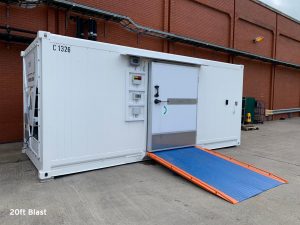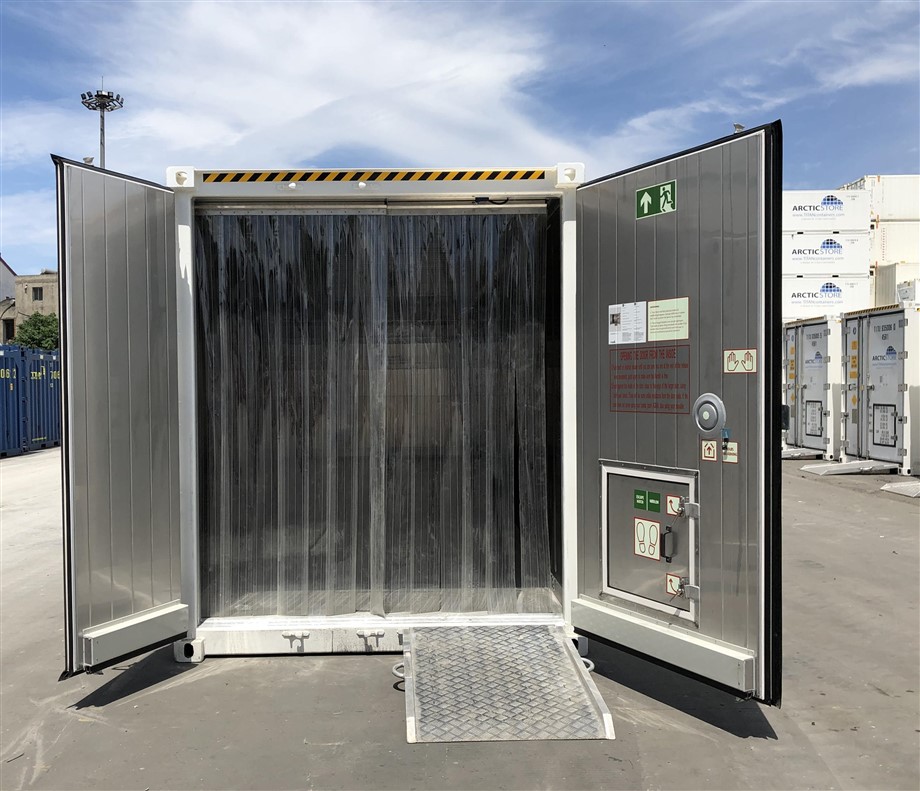All Regarding Freezer Containers: Important Insights for Your Storage Space Needs
Cold storage containers play an essential duty in the conservation of subject to spoiling items. They can be found in various types, consisting of cooled and insulated units, each made for certain storage space requirements. Comprehending the benefits and key features of these containers is important for companies intending to optimize their operations. As the need for efficient storage remedies expands, checking out the different options available can result in educated decisions that affect both earnings and sustainability. What aspects should one think about when selecting the right container?
Types of Cold Storage Space Containers
Cold store containers come in different kinds, each developed to meet certain temperature control needs. Amongst the most usual types are cooled containers, which maintain temperature levels between 0 ° C to 10 ° C, making them suitable for perishable products like fruits, veggies, and milk items. An additional type is the deep fridge freezer container, which operates at temperatures below -18 ° C, ideal for long-lasting storage space of icy things such as meats and seafood.
Insulated containers give temperature level security without active air conditioning, making them beneficial for temporary transportation of temperature-sensitive products. Furthermore, there are portable cold storage units, which offer adaptability in places and are commonly made use of in occasions or seasonal procedures. Blast chillers rapidly minimize the temperature level of hot foods, making sure safety and security and top quality. Each type serves an one-of-a-kind purpose in numerous markets, from food service to pharmaceuticals, emphasizing the significance of choosing the right container for certain storage needs.

Advantages of Utilizing Cold Store Solutions

Furthermore, cold store options extend the life span of products, decreasing waste and boosting success for services. By efficiently taking care of supply with appropriate temperature level control, firms can enhance their supply chains and improve operational effectiveness.
Additionally, freezer centers allow for adaptable storage alternatives, fitting various volume requirements and seasonal changes sought after (used 40ft refrigerated shipping containers). This adaptability helps businesses react swiftly to market changes
Last but not least, using freezer remedies can ensure conformity with health and wellness guidelines, protecting both customers and organizations. Overall, the strategic usage of freezer enhances item monitoring while promoting sustainability and financial feasibility.
Key Attributes to Search For in Freezer Containers
When picking freezer containers, numerous crucial attributes benefit careful consideration to safeguard peak performance and reliability. First, temperature control capabilities are vital; containers ought to keep constant temperatures suitable for particular goods. Insulation top quality also plays a considerable function, as superior insulation decreases energy consumption and improves temperature security.
Next off, ease of access and loading is crucial; containers ought to offer user-friendly designs for efficient handling and company. Longevity is one more crucial element; weather-resistant materials assure longevity and safeguard components versus ecological variables.
Furthermore, wheelchair functions, such as integrated wheels or lifting factors, facilitate transport, while personalized designs allow for tailored storage remedies.
Lastly, keeping track of systems, consisting of temperature alarm systems and remote monitoring, supply real-time updates, making specific that conditions stay excellent. By concentrating on these features, users can choose cold store containers that fulfill their functional needs successfully.
Choosing the Right Freezer Container for Your Needs
Choosing the best cold store container calls for a thoughtful assessment of operational needs and certain needs. Aspects such as the type of items being saved, temperature level level of sensitivity, and quantity ought to be focused on. Subject to spoiling food items may demand containers with rigid temperature level controls, while drugs may call for precise conditions to preserve efficacy.
Additionally, potential customers need to think about the container's dimension and flexibility. A bigger device may be essential for bulk storage space, while smaller sized, mobile options could be excellent for on-site or temporary requirements. Insulation top quality and energy performance are likewise essential, as these will impact operational prices and temperature level security.
Last but not least, conformity with sector laws and requirements is necessary, specifically in fields like food and healthcare. By carefully assessing these aspects, individuals can pick a cold store container that successfully satisfies their distinct demands and guarantees optimal storage conditions.
Finest Practices for Maintaining Freezer Issues
Maintaining suitable chilly storage problems is vital for protecting the high quality and safety of temperature-sensitive products. On a regular basis checking temperature and humidity levels is critical; making use of reliable electronic thermostats and hygrometers can supply accurate analyses. Appropriate insulation of cool storage containers helps decrease temperature fluctuations and energy loss.
Carrying out a first-in, first-out (FIFO) system guarantees that older inventory is made use of prior to newer stock, reducing waste (used 40ft refrigerated shipping containers). In addition, preserving an arranged layout within the storage space permits better air flow and minimizes the danger of cross-contamination
Regular upkeep look at tools, such as seals and compressors, are vital to avoid breakdowns. Team training on best practices for packing and dumping items aids maintain temperature level integrity. Keeping doors closed as much as possible limits warmth exchange, ensuring that the cool storage setting stays secure and efficient in protecting useful products.
Cost Factors To Consider for Cold Storage Solutions
When reviewing cool storage solutions, it is vital to consider the initial financial investment expenses together with continuous functional costs. A comprehensive break down of these prices can expose significant long-term savings possibility for services. Understanding these financial aspects helps stakeholders make informed choices regarding their cold storage demands.

First Investment Costs
The economic landscape of cold storage containers offers different preliminary financial investment expenses that companies have to think about. These costs normally include the purchase or rental rate of the containers, which can differ based upon dimension, type, and insulation high quality. In addition, costs connected to retrofitting existing structures to suit cool storage space should be factored in, especially if specialized tools is needed. Setup prices, consisting of electric job and refrigeration systems, also add to the overall first financial investment. Businesses must not neglect transportation prices for providing containers to their preferred location. Ultimately, prospective customization alternatives, such as shelving or temperature tracking systems, can better impact the initial economic expense. Careful budgeting for these variables is vital for effective freezer application.
Operational Expenditures Failure
Functional expenditures for cold store solutions incorporate several critical expense considerations that services need to navigate. Key aspects consist of energy expenses, which can be significant because of the requirement to keep low temperature levels. Maintenance costs are also significant, as regular servicing is necessary to ensure devices operates effectively and remains certified with health and wellness standards. In addition, labor costs might occur from click here the requirement for specialized team to keep track of the storage and handle setting. Insurance policy costs are one more consideration, as business should protect their investments versus possible losses. Any type of possible regulative compliance prices need to be factored in, as organizations may need to spend in systems that adhere to food safety and security and ecological policies. Recognizing these expenses is critical for reliable budgeting.
Long-Term Savings Possible
Buying cool storage space solutions provides substantial long-term savings potential, transforming preliminary expenditures right into monetary performance over time. By reducing spoilage and waste, organizations can improve their earnings margins substantially. Advanced insulation and energy-efficient systems decrease energy expenses, which build up over the life expectancy of the equipment. Moreover, freezer containers often need much less frequent maintenance compared to traditional refrigeration approaches, leading to lower fixing expenditures. The capability to shop items for prolonged periods without endangering high quality enables companies to profit from market variations, maximizing income. Furthermore, the scalability of cold store remedies allows business to adjust to transforming demands without sustaining extreme expenses. Overall, these elements add to an engaging situation for freezer as an affordable investment technique.
Often Asked Inquiries
How Much Time Can Food Be Saved in Cold Store Containers?
The duration food can be stored in cold store containers varies by type. Normally, disposable products last from days to weeks, while icy foods can continue to be risk-free for months, relying on proper temperature level and storage conditions.
Are Freezer Containers Energy-saving?
The power efficiency of cool storage space containers varies based upon design and insulation top quality. Modern devices commonly utilize innovative technology to minimize energy usage, ultimately adding to lowered functional prices and environmental influence in lasting use.
Can Cold Store Containers Be Custom-made for Particular Demands?
Freezer containers can without a doubt be personalized to meet details demands. Adjustments may include temperature level controls, size modifications, and added features, permitting individuals to tailor services effectively for numerous storage space needs and functional preferences.
What Are the Usual Sizes of Cold Store Containers?
Cold store containers commonly are available in common dimensions such as 10, 20, and 40 feet. These measurements fit different storage space demands, making certain flexibility for businesses requiring temperature-controlled settings for disposable goods or sensitive materials.
Do Cold Store Containers Require Unique Authorizations for Use?
Cold store containers typically call for special licenses for use, relying on local policies and intended applications. Authorities may mandate authorizations to assure safety requirements, ecological conformity, and correct functional techniques are preserved during their application.
Cold storage containers come in different types, each created to fulfill certain temperature control requirements. In addition, cool storage facilities permit for versatile storage space alternatives, accommodating various volume requirements and seasonal changes in need. Picking the ideal cold storage container requires a thoughtful analysis of functional needs and certain requirements. The economic landscape of cold storage containers provides different preliminary financial investment expenses that companies must consider. Cold storage space containers can undoubtedly be personalized to meet certain requirements.